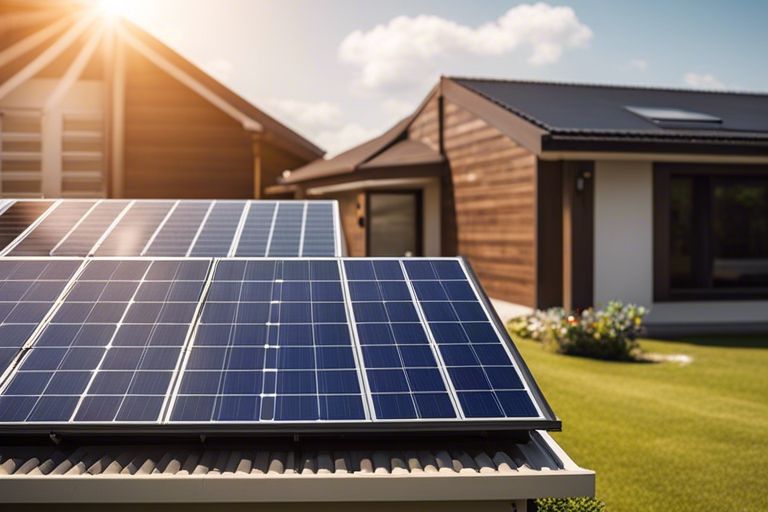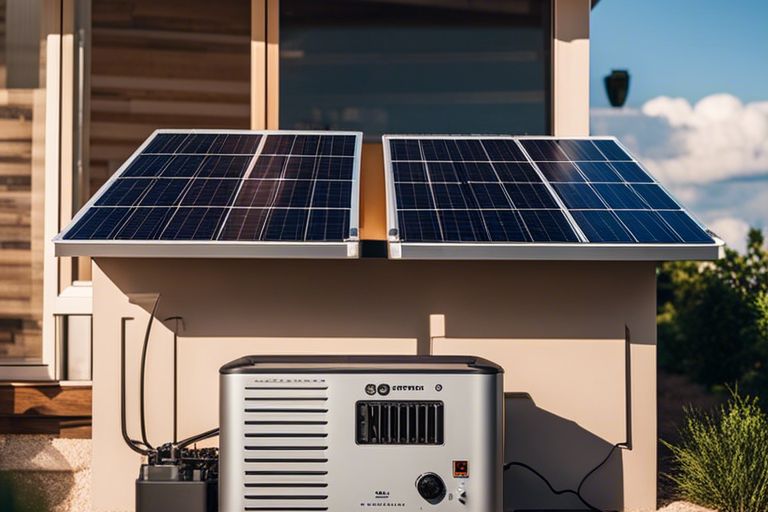Solar energy is a powerful and sustainable way to generate electricity for your home. When considering how big of a solar generator you need for your house, factors like your energy consumption, location, and available sunlight play crucial roles. In this blog post, we will break down the steps to help you determine the optimal size of a solar generator for your household needs, ensuring you harness the full potential of solar power efficiently and effectively.
Key Takeaways:
- Evaluate your energy needs: Calculate the total energy consumption of your household to determine the size of the solar generator needed.
- Consider peak loads: Factor in peak energy consumption times and appliances that require more power to ensure your solar generator can handle these loads.
- Choose the right size: Select a solar generator that meets your energy needs without exceeding them to avoid unnecessary costs.
- Consult a professional: It is advisable to consult with a solar energy professional to assess your specific requirements and recommend the most suitable generator size.
- Plan for future growth: Anticipate any future additions or changes to your energy consumption to ensure your solar generator can accommodate these modifications.
Determining Your Energy Needs
Calculating Your Daily Energy Consumption
The first step in determining the size of the solar generator you need for your house is to calculate your daily energy consumption. Any solar generator system you install should be capable of supplying enough power to meet your daily needs. To calculate this, you can start by looking at your monthly electricity bills to get an idea of your average daily energy usage.
Identifying Energy-Hungry Appliances
To accurately determine your energy needs, you must identify the energy-hungry appliances in your home. Consumption of appliances such as air conditioners, refrigerators, heaters, and washing machines can significantly impact your energy usage. By isolating these high-energy consumption devices, you can better estimate the size of the solar generator required to power your household.
The energy-hungry appliances in your home typically include those that run continuously or for extended periods, such as air conditioners and refrigerators. These devices consume a large amount of power throughout the day, so it’s crucial to factor them into your calculations when determining your energy needs.

Assessing Your Solar Resource
Evaluating Your Location’s Solar Irradiance
Now, let’s start by evaluating your location’s solar irradiance. Solar irradiance is the amount of solar power received per unit area at a given time. You can use online tools or consult with a solar energy expert to determine the average solar irradiance in your area. This information will help you understand how much sunlight your location receives throughout the year, which is crucial for sizing your solar generator appropriately.
Considering Shading and Obstructions
Obstructions such as trees, buildings, or tall structures can significantly impact the amount of sunlight reaching your solar panels. It’s vital to assess the shading patterns on your property throughout the day to identify any potential obstructions that may affect your solar generator’s performance. By minimizing shading and obstructions, you can maximize the efficiency of your solar system and ensure optimal energy production.
Solar panels work most efficiently when they receive direct sunlight without any shading or obstructions. If you have limited space or unavoidable shading issues, you may need to consider alternative mounting options or technologies like micro-inverters to optimize energy production.

Sizing Your Solar Generator
Many factors come into play when determining the size of the solar generator you need for your house. By matching your energy needs to the generator capacity and accounting for efficiency and losses, you can ensure that your solar power system meets your requirements efficiently.
Matching Your Energy Needs to Generator Capacity
Generator capacity refers to the amount of electricity the solar generator can produce at a given moment. To determine the right size for your house, you should first assess your energy needs. Calculate the average daily energy consumption of your household in kilowatt-hours (kWh). This will give you an idea of how much electricity you need to generate to meet your daily requirements.
Accounting for Efficiency and Losses
Your solar generator’s capacity should not only match your energy needs but also account for efficiency and losses in the system. Solar panels, inverters, and batteries all experience some level of energy loss during the conversion and storage process. It’s vital to consider these losses when sizing your solar generator to ensure that you have enough capacity to offset them.
Your solar panels’ efficiency can vary depending on factors such as shading, orientation, and temperature. Inverters also introduce some energy loss during the conversion of DC power from the panels to AC power used in your home. Additionally, batteries experience energy loss during the charging and discharging cycles. By accounting for these inefficiencies, you can accurately size your solar generator to meet your energy needs.

Considering Battery Backup and Storage
Not only do you need to consider the size of the solar panels and the inverter when setting up a solar generator for your house, but you also need to think about battery backup and storage. Batteries play a crucial role in ensuring that you have a reliable power supply even when the sun isn’t shining.
The Role of Batteries in Solar Generators
On top of generating electricity from sunlight, solar panels also charge batteries that store excess energy for later use. This stored energy can be used during the night or on cloudy days when the solar panels are not producing enough electricity. Batteries act as a backup system, providing you with a continuous power supply and increasing your energy independence.
Sizing Batteries for Your Energy Needs
The key to sizing batteries for your energy needs is to calculate how much energy your household consumes daily. This includes the energy used by appliances, lights, electronics, and other devices. By understanding your energy consumption patterns, you can determine the capacity of batteries required to meet your needs efficiently.
Understanding your energy requirements and how batteries can support your solar generator is imperative for ensuring a reliable and sustainable power supply for your home. Properly sizing your batteries will help you maximize the benefits of your solar generator system and reduce your reliance on the grid.
Additional Factors to Consider
-
Inverter Capacity and Type
Your inverter plays a crucial role in determining the size of the solar generator you need for your house. The inverter converts the direct current (DC) electricity generated by the solar panels into usable alternating current (AC) electricity for your appliances. When sizing your solar generator, make sure the inverter can handle the total wattage of the appliances you plan to power. Additionally, consider the type of inverter – whether it’s a pure sine wave inverter, which provides clean and stable power, or a modified sine wave inverter, which is more affordable but may not be suitable for all electronic devices.
Ultimately, the inverter capacity and type should align with your energy needs and the type of appliances you intend to run on solar power. Be mindful of, the inverter is a crucial component in your solar generator setup that directly affects its performance and compatibility with your household appliances. Thou, take your time to assess your energy requirements carefully before deciding on the inverter capacity and type.
-
Charging Time and Cycle Life
Consider the charging time and cycle life of the solar generator when determining the size suitable for your house. The charging time refers to how long it takes to fully charge the generator using solar energy. A shorter charging time may be preferable if you need to rely on your solar generator frequently or during emergencies.
This factor is closely related to the cycle life of the batteries in the solar generator. Cycle life indicates the number of charge-discharge cycles a battery can endure before its capacity degrades significantly. A solar generator with a longer cycle life is more durable and cost-effective in the long run, as it can sustain multiple charging cycles over its lifetime. This information can help you decide on the size of the solar generator that best fits your household’s energy usage patterns and longevity requirements.
Real-World Examples and Scenarios
Small Homes and Cabins
All small homes and cabins have different energy needs, so let’s look at a few examples to give you an idea of the solar generator size required for typical usage.
For a small off-grid cabin with minimal electricity needs, a 400-800-watt solar generator paired with a small battery bank may suffice. This setup can power necessary devices like lights, a small refrigerator, and electronics for basic needs.
Medium-Sized Homes
An average-sized home with moderate energy consumption will likely need a solar generator in the range of 5-15 kilowatts to meet its daily power needs. This size of the system can comfortably power household appliances, lighting, electronics, and some heating or cooling systems.
When considering a solar generator for a medium-sized home, take into account your daily energy consumption patterns. Factors such as the efficiency of your appliances and the number of occupants in the house will influence the size of the solar generator you need.
Large Homes and Estates
For larger homes and estates with high energy demands, such as extensive heating and cooling systems, multiple refrigerators, and swimming pools, a solar generator upwards of 20 kilowatts or more may be necessary. These systems can handle the increased load and provide sufficient power for all your needs.
When looking at solar generators for large homes, it’s necessary to work with a solar energy provider to assess your energy requirements accurately. They can help you determine the optimal size and configuration to ensure your home runs efficiently on solar power.
To wrap up
Conclusively, when determining how big of a solar generator you need for your house, it is imperative to consider factors such as your energy consumption, the appliances you plan to power, and the duration of backup power you require. To investigate deeper into this topic and calculate the ideal size of a solar generator for your home, you can refer to the insightful article on What Size Solar Generator Do You Need for a House?. Making an informed decision based on your specific needs and available resources will help you harness the benefits of solar energy efficiently.
FAQ
Q: How do I determine how big of a solar generator I need for my house?
A: To determine the size of the solar generator you need for your house, you should consider your average daily electricity consumption, the peak power usage at any given time, the number of hours of sunlight in your location, and the efficiency of the solar panels. It is recommended to consult with a solar energy expert who can analyze your energy needs and help you choose the right size generator.
Q: What factors should I consider when deciding on the size of a solar generator for my house?
A: Some key factors to consider when determining the size of a solar generator for your house include the available roof space for solar panels, your budget for the installation, the local climate and weather conditions that affect sunlight exposure, and any energy-efficient upgrades or appliances you plan to install in the future. All these factors will impact the size of the solar generator you will need.
Q: Is it better to have a larger solar generator for my house than a smaller one?
A: Having a larger solar generator for your house than necessary can be beneficial in some cases, as it can provide more power during peak usage times or cloudy days when sunlight is limited. However, it is important to balance the system size with your actual energy needs to avoid overspending on unnecessary capacity. Consulting with a professional to assess your requirements is the best way to ensure you get the right-sized solar generator for your home.
